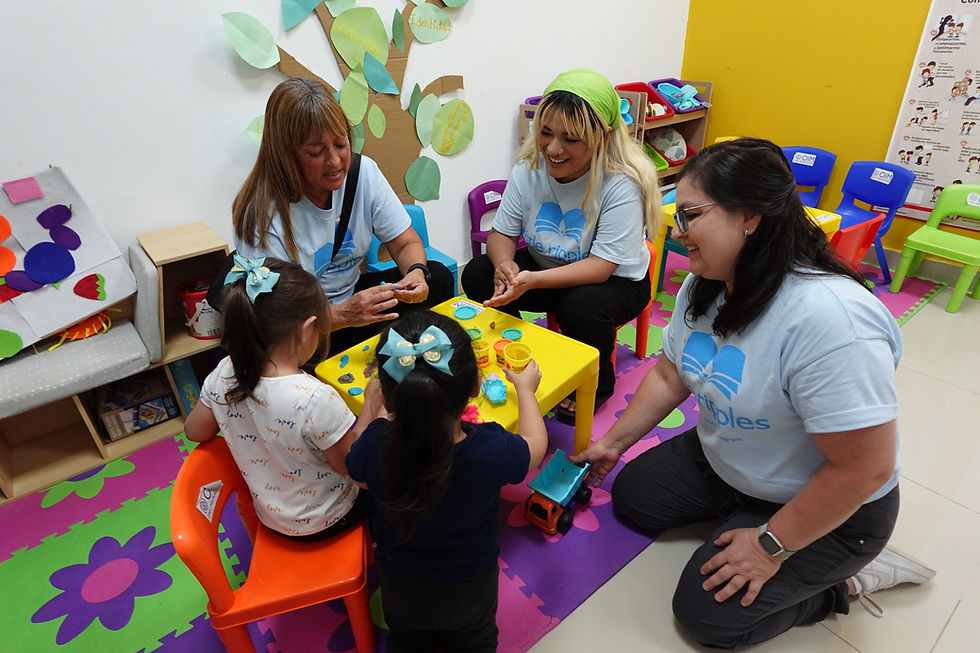Tools of Empathy at the World Innovation Summit on Education
- Katie-Jay Scott
- Nov 22, 2017
- 3 min read
Updated: Feb 19, 2024
Last week, Gabriel and I headed to Doha, Qatar, for the World Innovation Summit on Education, otherwise known simply as WISE (check out #WISE2017 on social media). You may remember that last year, Little Ripples won the 2016 WISE Award. It is not only innovative to provide a whole-child approach to early childhood development in emergency and protracted crises, but to have a program entirely led by refugees themselves is an exception in the humanitarian sphere. Little Ripples does both!
This year, iACT was invited back as a community partner to present the first-ever Hackathon challenge to the WISE Learners’ Voice 2017-2018 cohort. The challenge for the cohort was this: How can iACT scale Little Ripples to reach the millions of displaced children ages three to five without compromising quality? As we all know, iACT firmly believes in creating islands of peace and joy in refugee camps through programs that restore dignity, build capacity, and have deep, meaningful impact. It is quite the challenge that iACT has been working on for a while.
So, over a 48-hour period leading up to the Summit, I was locked indoors with the 2017-18 Cohort and 25 outstanding community members living and working in Qatar. Together, the group of 50 worked through a process of pitching 27 initial solutions to the challenge, voting those down to nine, and eventually crafting six solid solutions to the Little Ripples challenge. At the Summit, these smaller groups each had four minutes to present their ideas to a panel of judges. The criteria included characteristics such as scalability and cultural relevancy, iACT’s capacity to implement, and whether the idea increased financial means without stretching current partners and donors.
In short, the ideas were outstanding. I was blown away by the high-level thought leadership that the teams poured into six very diverse solutions. In the end, I had to choose one! Eek! It was very difficult, and I ended up choosing three with two solutions tied for second place. And the winner was…
“A Tool for Empathy: The Book of Masks”
Now, the name might change as we build out the idea, but my heart is beaming with excitement around the potential. As for how it works, you will have to use your imagination until we’ve created a prototype and piloted the idea in different settings, but here goes: the book has multiple masks of different animals that can be used either one time to decorate or as a stencil for multiple children to use on a revolving basis. In the book is simple information on how the creation and use of masks can help the physical, social-emotional, and cognitive learning of young children (probably of ages three to eight). Teachers or parents can ask their children to make masks that represent real animals, leading to such lessons that touch upon colors, sounds, names, literacy, etc. Or, they can ask children to make masks that represent different emotions. Helping develop language around identifying how children feel is also the first step in nonviolent communication and restorative practices, both of which are taught at Little Ripples. The masks become an essential element of storytelling (literacy and cultural relevancy!) as well as the foundation for using expressive arts as trauma therapy.
Basically, it’s a tool for early childhood development. But, here’s the thing: it has multiple implications for strengthening Little Ripples, including with its use during teacher training sessions, in the classroom, and as a tool to inviting the community in to be part of Little Ripples. It can be easily incorporated into our empathy-based Little Ripples Global Citizens curriculum for preschools to learn about their refugee peers.
It has two more essential purposes. First, it can be a buy-one-give-one commodity sold in stores and online for mothers like me around the world to use with their own daughters and sons. It’s a tool to educate children everywhere while empowering families to give back to Little Ripples through their purchase. Second (and this is the one that needs the most building out), it can be given to caregivers and leaders monitoring child-friendly spaces immediately upon arriving in refugee and displaced persons camps, to begin to empower, heal, and educate the child and adult alike, thus growing the impact of Little Ripples.
There is a lot of work to be done. The Learners’ Voice team punted the idea to us, and now iACT is running with it. We are even looking for founding “Charter Partners” (corporations, businesses, design firms, foundations, artists, and more) to be part of this creative and potentially life-changing initiative. Are you with us?
A special thanks to the entire WISE Hackathon team who presented Book of Masks and who continue to help iACT work on the idea: Bilal Anwer Sheikh, HY William Chan, Athar Kamal, Luyolo Mazwembe, Omeima Osman, and Memoonah Zaineb!


